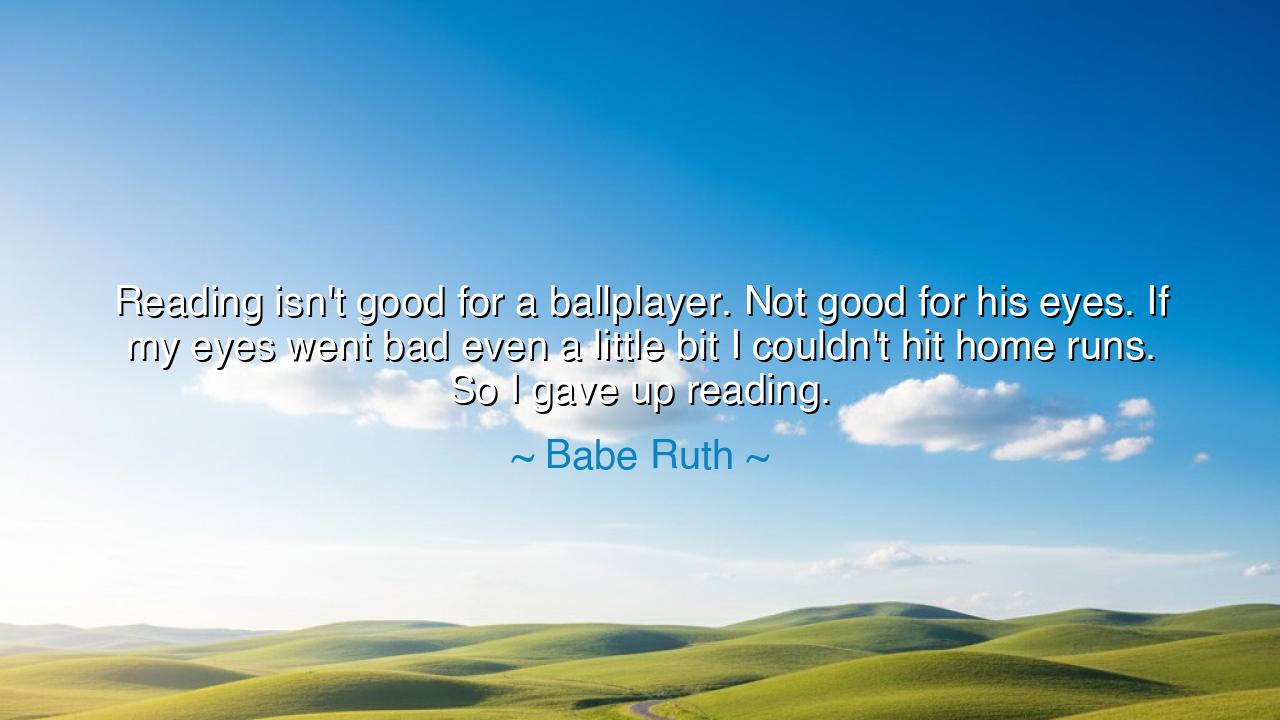
Reading isn't good for a ballplayer. Not good for his eyes. If my
Reading isn't good for a ballplayer. Not good for his eyes. If my eyes went bad even a little bit I couldn't hit home runs. So I gave up reading.






In the bold and almost childlike words of Babe Ruth, the titan of baseball and symbol of American vigor, we hear a declaration both humorous and profound: “Reading isn't good for a ballplayer. Not good for his eyes. If my eyes went bad even a little bit I couldn't hit home runs. So I gave up reading.” At first glance, these words seem to come from the mouth of a man who prized instinct over intellect, power over polish. Yet beneath the laughter they provoke lies a deeper reflection on focus, sacrifice, and the singular devotion required of those who strive for greatness. For Ruth, the greatest hitter of his age, the eyes were sacred instruments—the windows through which destiny was measured in inches and milliseconds—and he would let nothing, not even the pursuit of knowledge, dull their precision.
Babe Ruth, born George Herman Ruth Jr., rose from poverty to immortality through his gifts on the baseball field. He was not a scholar of books but of life, learning in the rough school of orphanages, streets, and stadiums. His genius was physical, intuitive, alive in motion. To him, the written word was stillness, and stillness could not feed the fire that made him who he was. When he spoke of giving up reading, he did not mean to reject wisdom, but to reveal his understanding that true mastery demands focus so fierce it borders on obsession. Every moment of his being, every breath and every blink, was given to the swing—to that perfect meeting of wood and ball that sent crowds into ecstasy and his name into legend.
The ancients would have recognized something divine in such focus. The Greeks called it arete, the excellence that arises when a person fulfills their purpose with complete devotion. For the archer, it was the bow; for the sculptor, the chisel; for Babe Ruth, it was the bat and his eyes. Just as the warrior Polydamas would not blunt his sword through carelessness, Ruth would not risk his vision through distraction. His creed, though spoken in jest, reflects an ancient truth: that greatness demands sacrifice, and that even the smallest indulgence, when it threatens one’s craft, must be cast aside. This is the law of mastery that governs every field—from the athlete’s discipline to the artist’s solitude.
There is, however, a dual nature to his words. For while Ruth’s choice elevated him to superhuman achievement, it also reveals the cost of singular devotion. In choosing to forsake the book, he chose the field alone—the applause, the light, the fleeting glory of youth. His life burned bright but fast, his wisdom written not in ink but in legend. In this, he stands beside figures like Achilles, who chose a short, brilliant life over a long, quiet one. Both men understood that one cannot hold eternity without letting go of comfort. Ruth’s sacrifice, then, was not of reading alone, but of balance—the eternal trade between greatness and peace.
History offers many who, like Ruth, gave everything to a single calling. The composer Beethoven, when struck by deafness, refused despair; he poured his soul into the vibrations of sound he could no longer hear. The samurai of old trained their minds to see through movement alone, trusting the eye’s instinct more than the scholar’s reason. Ruth belonged to this lineage of men whose genius was lived rather than learned—whose truths were felt, not studied. His joke about “giving up reading” was, perhaps unknowingly, the creed of every person who dares to live entirely for their gift.
Yet we, who hear his words from afar, must not mistake imitation for understanding. Babe Ruth’s focus was his destiny, but each person’s calling demands a different balance. Some are born to read the stars; others to swing the bat that makes the heavens move. The wisdom of his statement is not to reject learning, but to embrace purpose—to know what must be protected at all costs. If your “eyes,” whatever they may be—the instruments of your art or your livelihood—are sacred to your mission, guard them. But do not scorn the knowledge of others, for even Ruth’s legend was told by those who could write.
So, my children of tomorrow, take from Babe Ruth’s words both humility and resolve. Know that every great pursuit requires sacrifice, and that to reach the heights of your ability, you must be willing to surrender what hinders it. But also know that strength without wisdom is incomplete. Seek focus, but not blindness; passion, but not obsession. For the truest greatness is found not merely in the perfection of one gift, but in the harmony of many. Ruth gave up reading for his swing—and in doing so, became immortal in his craft. You, too, must decide what you are willing to set aside to fulfill your destiny. But whatever path you choose, walk it with his same fire: fierce, fearless, and utterly devoted to the vision before you.






AAdministratorAdministrator
Welcome, honored guests. Please leave a comment, we will respond soon